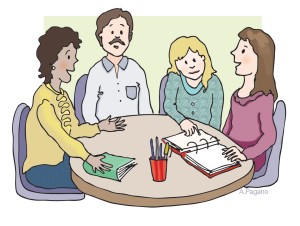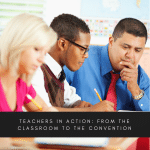 This is the story of how direct democracy in Vermont engages with the needs of education.
This is the story of how direct democracy in Vermont engages with the needs of education.
A March 6, headline in the Burlington Free Press dominated social media:
“It’s Official: 2014 is a Bad Year for School Budgets.” Reporter Molly Walsh, the supposed eyes and ears of education in Vermont, portends towards dramatic enthusiasm at the demise of education. Of the 252 school budgets, 35 did not “tank.” While it stands at the highest number of failed votes since 2003, continued conversations through talk radio, blogs and Facebook tell a different story. The value of education is sound and the reasons for not passing budgets vary. Negative votes have drawn attention from the statehouse; vocal dissenters are using the education platform to gain a voice on other issues.
Vermont’s Town Meeting Day, the first Tuesday in March, a tradition older than the 1791 statehood, takes place in town halls, schools, and auditoriums. It is a day long forum for democratic debate followed by majority rule voting. Eligible tax payers of the town vote on specific issues announced through a published pamphlet. Some towns still carry the tradition of voice vote or paper ballot. And many towns have moved towards Australian Ballot. Direct Democracy is time consuming, it gets personal, people say what is on their mind even if it isn’t entirely sensible. It used to be followed by potluck luncheons or breakfasts as a means for ending contention. People volunteered creative measures to meet tax burdens, offering labor and services in lieu of taxes. Some offered livestock or portions of a harvest.
Today, the anchor issue on all ballots is the funding of public education. Governor Shumlin concurred that voter dissatisfaction with per pupil rate of increase on taxes and declining student enrollment is the heart of the most disagreements. A recent March 14 Vermont Edition talk show on Vermont Public Radio presented school consolidation plans with the House and Senate Education Committee Chairs. Call ins by Vermonters were adamant that the failed budgets were not really about schools or support of spending on students. One caller assured her “no” vote was based on dissatisfaction with benefits for administration without direct benefits for students. Another caller wanted attention brought to the lack of diverse employment opportunities statewide. In his view, declining enrollments are a result of unemployment; Vermonters are moving out of state. People living in the state’s capitol are grappling with double digit tax-rate increases, based on the Legislature’s formula to use a 7 cent increase in base residential property tax. So, they too, are voting down this educational funding plan. Anger over property tax is the impetus for findings of fault in proposed school budgets, yet most budgets I know of are presented at a “bare bones” level. One town in particular is weighing the viability of its rural k-12, one room school house with 21st century learning environments. While consolidation with a school 6 miles away makes sense, the school is the aesthetic pride of this town. It is the one place except for the volunteer fire department that community projects are not only formed but initiated. Our Town Meeting takes place at the high school as do most community gatherings. Schools are the heart of what Vermonters still value as community.
Providing 21st century learning centers for students at a lower cost was at the heart of most debates. While pundits point out schools are failing to to make staffing reductions My daughter’s elementary school is retiring one of its most valued employees and actively pursuing Americorps volunteers for school programs at a fraction of a teacher’s salary. Several of my daughter’s playmates have left the school system in favor of home schooling or a local private Catholic school, and yet the enrollment is still on the rise, with average classroom populations of 20-25.
Our town of Hyde Park did pass its budget after much heated debate. And afterwards we all went home without the organized child care, pot luck luncheons or club sponsored breakfast; the school hallways were eerily quiet. There had been only about 200 attendees. We passed 10 articles in the first hour of the meeting and then got bogged down with the public elementary school budget. We began with a projected multimedia school board presentation reporting on rising assessment scores. We recognized the retiring veteran teacher who gave 41 years of service with a state resolution. During the question and answer session, I sat in the audience tweeting for anyone interested or not in attendance. There was scrutiny of the $200,000.00 + in spending, the use of color paper copies, and busing to after school care. Some vocalized negative experiences based on their own child’s frustrations in school. A school board member fired back at the rising tide of anti-school sentiment by assuring of a monetary investment in education and his own children’s success in the elementary school. His insistence was seconded by another who stood to remind all residents that our town have a tradition of not using the school systems as a punching bag. That towns can send their message to the state legislature but not at the expense of schooling. It tipped the call for a paper ballot and the almost 2/3 majority win.
My relief was substituted by curiosity. What drives people to argue for hours, this one day of the year but avoid attendance at school board meetings? Why does direct democracy have to be so contentious? Is venting and spewing healthy? I met with our principal during a break in the session. We both contemplated what a “no” vote would have meant for our town. It would have meant hosting a special session which also contains a per vote cost. It would rely on the expectation that teachers without a contract would continue to stay at the school. Or that a principal fighting for the school budget wouldn’t weigh the cost of a battle versus the cost of other employment. A Facebook thread has begun, urging the community to rethink our tradition of direct democracy in favor of Australian Ballot. School Budgets can not dangle by a thread.



